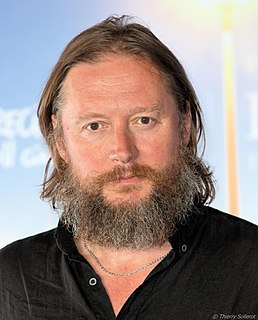Top 42 Quotes & Sayings by David MacKenzie
Explore popular quotes and sayings by a Scottish director David MacKenzie.
Last updated on December 21, 2024.
I like the idea of the audience absorbing the language and getting to understand it as they journey through the film. It starts off being more obscure, but you get used to it. A 'Clockwork Orange' thing. I read 'Clockwork Orange' without any vocabulary, and I got to understand the words as I went through it. I like that process. It immerses you.
I have a memory of this experience when I was young, watching 'Stop Making Sense,' the Talking Heads concert movie, which is one of the best concert movies ever, and I saw it in a full house in New Zealand, and everyone was cheering between songs, and you really felt like you were part of the audience at the gig.
Event cinema is what it is, and I understand why it's successful. It started with things like 'Jaws,' which are extraordinary movies. But what we've lost are great character films which are beautifully directed and had great movie stars in them. Films that were about something rather than about spectacle.
The problem with the British film industry is that it's really the American film industry, or a small branch of in lots of ways because of the common language. But it's great to see some individual voices still there. I think I probably gravitate towards a slightly more European, auteur model rather than the studio thing. I think it would be great if British films were a little bit more auteur driven.
I find most American films annoy me because their third act tends to be tying up loose ends and returning to moral values and killing the monster. I think most of the scripts I read to tend to go in that direction and I find that very, very unsatisfying. I want the stories to have loose ends and to pose some questions - or even say things that aren't too comfortable.
The way I generally work is that I do try to leave as many decisions as I possibly can to the day of, because it feels like that's where you're most in tune to what's going on. I sort of feel like my job is to be a conduit to opportunities, to maximize the creativity of the day itself - because that's when the cameras are running. That's the important thing to me.
I don't have any interest in doing superhero franchise movies. I don't connect to the fantastic and I'm not a comic person, it's just not my thing, so I'm not looking in that direction - but ambitious films on a big scale I'm very interested in looking at. I'm interested in reality, I'm interested in people, so it's just about finding a project I'm interested in.






















